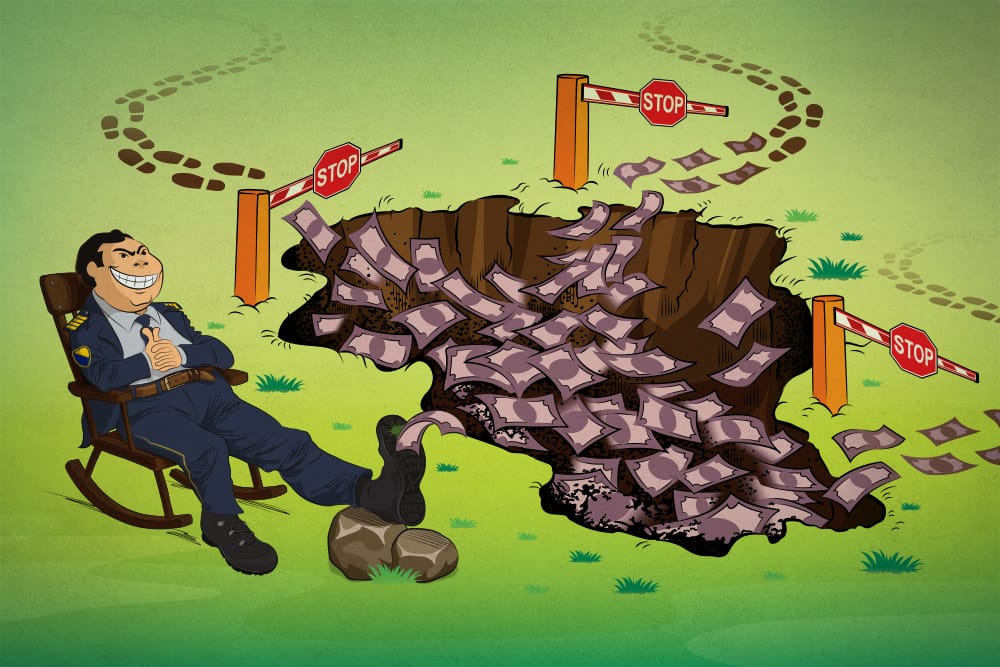In mid-2018, Zdravko Ljubinković, a millionaire from Bijeljina, set off to Belgrade to buy an apartment in the new settlement “Belgrade Waterfront.” Since luxury costs, Ljubinković had to take a large amount of money from Bosnia and Herzegovina (BiH). He first transferred EUR 200,000 through the Rača border crossing, and three days later another EUR 130,000, and a few months later another EUR 170,000. So half a million was quickly ready to buy an apartment in Serbia. Ljubinković was legally required to declare this cash to the customs, but he hasn’t done so once. Seldom do customs control such transfers, and even more seldom do they prevent them.
“I took it out, and the state of Bosnia and Herzegovina made it possible for me,” he says, “Nobody asks you anything!”
Ljubinković is just one of many citizens who illegally take out cash from the state. CIN journalists reveal that in the period from the beginning of 2018 to October 2020, at least BAM 37.6 million marks have been moved from BiH to Serbia, Montenegro, and Croatia in different currencies.
The Customs, which operates under the Indirect Taxation Authority of BiH (ITA BiH), does not know about this money because they do not cooperate with their counterparts in neighboring countries who have this information.
When leaving the country, passengers must show customs officers an approval to transfer large sums of money, while they need nothing more than an oral declaration to bring it to another country. These approvals are regarded by ITA as proof of the origin of money, but the journalists found out that the Entity ministries do not check the origin, claiming that this is not part of their responsibility.
If the proceeds of crime are taken across the border, rarely do we see the perpetrators punished because it is difficult to trace the money, says the state prosecutor and vice president of the High Judicial and Prosecutorial Council Biljana Simeunović: “When it is moved in this way, it is impossible, I’d say.”
Walked Away Scot Free
Zdravko Ljubinković is a 68-year-old businessman from Bijeljina, who earned his first million by working in Switzerland. He says he now legally earns more than EUR 1,000 a day but admits he has not always worked by the law. In the 1980s, he returned to BiH and started an illegal business. “I’ve smuggled cigarettes and got rich on cigarettes and oil. And walked away scot-free! No one can lawfully make a fortune. That’s not possible,” he told CIN.
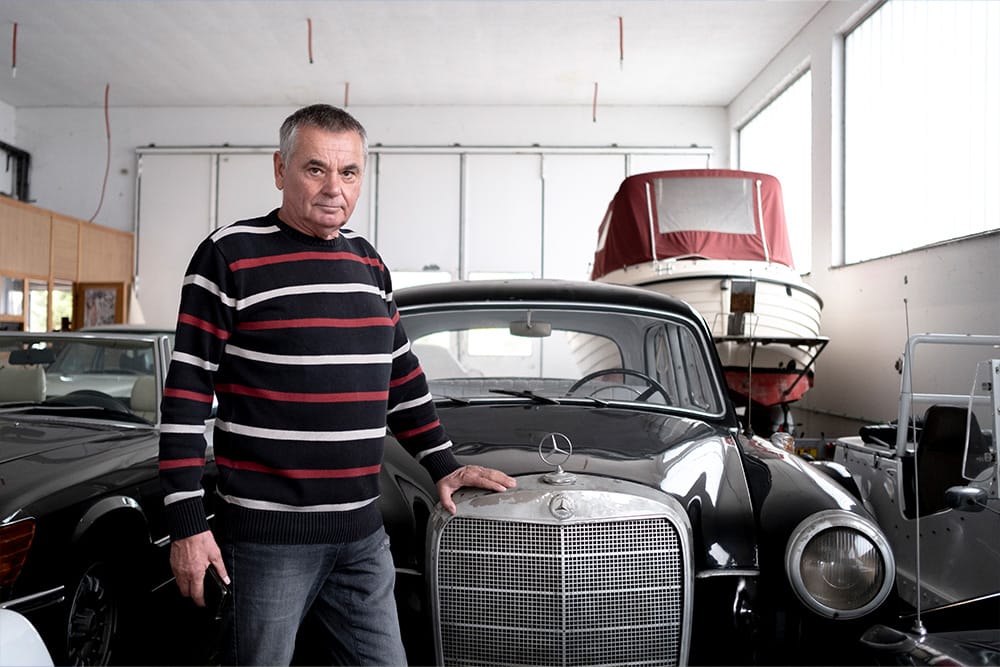
He was convicted of illegal origin of money he earned in the 80s and 90s through smuggling, but time was on his side, and the high inflation reduced his fine of half a million marks to only BAM 4,700.
“I got out of that business when I took a lot of money, but I was wise. I did not have much schooling at the time, and I was afraid of the law.”
Ljubinković claims he placed the money into a legal business in Bijeljina in the mid-1990s. “I’ve built 10-11 thousand square meters at the time. I collect high rents, and have a lot of apartments in the city – that’s enough for me!” Today he owns the “MDI company”, a gas station, a vehicle technical inspection, a motel, a restaurant, a cafe, a car rental, many real estates, and 18 expensive old-timers.
“I’m not saying I’m legit. I’ve been stealing and stealing, wherever I saw the opportunity. But I don’t need it anymore. I don’t need it, and I do not want to take part in it anymore. I barely got away.”
Ljubinković feels that he did nothing wrong by taking half a million euros out of the country illegally. In his opinion, the state should be looking after that.
“In 99% of the cases, there are no customs officers there. Am I supposed to wait for them to ask me? Sure, I’m a fool to say I have money. Come on, let’s not be childish!”
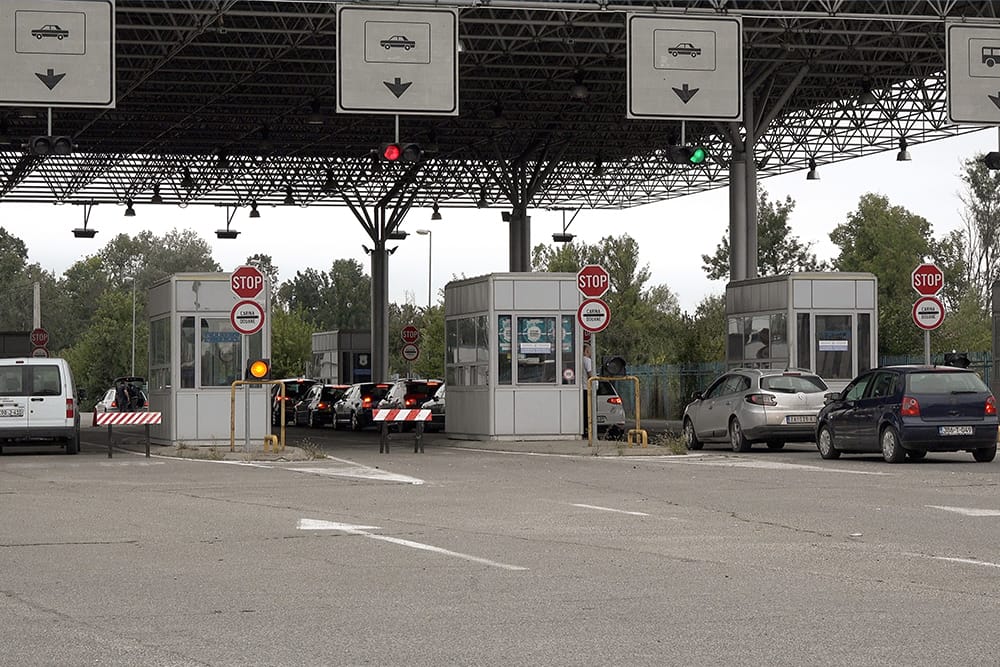
The ITABiH Customs Service is in charge of controlling the amount of cash leaving the country. For any amount exceeding 10 thousand euros, passengers must show the customs officers the approval of the Entity ministries of finance or the Brčko District Finance Directorate. To obtain approval, one must present ID and the document showing the purpose for which the money is being transferred, information on the vehicle used for the transfer, and other documents, as requested by the institutions, and wait for 15 days.
In three years, only seven cash transfer approvals were issued.
“The problem is about their expectations. They think the approval process should not take more than a minute, just to print them the approval and off they go.“ There is a due process that we must comply with,” says Akif Pezerović from the Finance Directorate of the Brčko District.
Ljubinković could not wait for the institutions because he was in a hurry: “The cost of the apartment was 540 thousand, and now it is worth a million and a half. It is all about speed!”
He duly declared the cash at the Serbian border and claims to have carried real estate sales contracts with him to prove the origin of the cash. If Ljubinković had concealed money from Serbian customs officers, he would have been in much greater danger of being discovered and punished than is the case at BiH customs.
From 2018 to October 2020, domestic customs officers at the Rača border crossing did not prevent any undeclared money transfer, while their Serbian counterparts stopped and confiscated more than 111 thousand euros in cash.
At the same time, in addition to Ljubinković’s half a million euros, another EUR 12.8 million were illegally carried out through this border crossing, which was declared at the entrance to Serbia. The head of the customs office, Dragan Dragić, knows only for 65 thousand euros.
“That’s all that was declared to us, and we don’t know that there was more. We do not know.”
According to him, customs officers have no ways to determine which passenger is suspicious and which is not, because, unlike border police officers, they do not have access to their documents.
When asked if he sees the problem about not knowing that all this money is illegally leaving BiH, Dragić responded: “Well, I don’t know that it is leaving, so how can I have a problem with something that I do not know is a problem?
Such a system suits Zdravko Ljubinković: “Should I be chasing them, and checking on their whereabouts? Go head over there and see for yourself, nobody will ask. I won’t be waiting for them for sure. I’m fine if they aren’t there!”
An obvious problem
According to ITABiH statistics, from 2018 to October 2020, nearly BAM 700 thousand in cash were taken out to Serbia and Montenegro, while 44 times the amount entered these two countries, as declared by their authorities, BAM 30 million to Serbia and BAM 909 thousand to Montenegro.
Most of the money, as much as BAM 3.3 billion, went to Croatia, mostly through legal entities. The Croatian Ministry of Finance did not provide complete data on the entry of money into the country, but partial data show that during 2018, BAM 7.3 million were illegally brought into Croatia through eight border crossings.
All that money was taken out of the country without BiH financial institutions knowing about it.
“The obvious negligence of our services,” says prosecutor Biljana Simeunović, “This situation shows that people who take cash out of the country have neither need nor responsibility, let alone fear from not declaring it. Yet, they know that the services in the neighboring countries are functioning with more diligence, which is why they declare it.”
From 2015 until today, the Prosecutor’s Office of BiH has initiated 35 investigations against 167 persons for money laundering and organized crime related to money laundering and filed 16 indictments. The Court of Bosnia and Herzegovina has rendered judgments in 10 cases against 67 persons.
The State Investigation and Protection Agency (SIPA) explains that taking out cash and investing it in property abroad is a common form of money laundering. Customs officers of ITABIH are the first line of defense against such an activity, but according to their reports – such things do not happen at the state borders. Namely, in three years, SIPA has not received a single report of suspicious or actual cash transfers.
Although they are responsible for supervising and controlling cash transfers, the head of the Rača customs office Dragan Dragić claims they cannot perform this task efficiently because the state does not have an elaborate system in place and the customs do not have access to suspicious person database (register of persons suspected, accused and convicted of money laundering).
“If anyone thinks that a customs officer can guess who is carrying it, they should know that he cannot. But even a blind squirrel finds a nut once in a while, and so can we, but rarely”, Dragić.
However, practice shows that one can “find” much more when there is interest in being diligent: from the beginning of 2015 to May 2017, customs officers prevented at least 98 attempts of illegal cash transfer across the border. This was enough to remove BiH from the international Money Laundering Watchdog’s Gray List, where it was listed for two and a half years. Over the next three years, customs officers stopped the illegal cash transfer only six times.
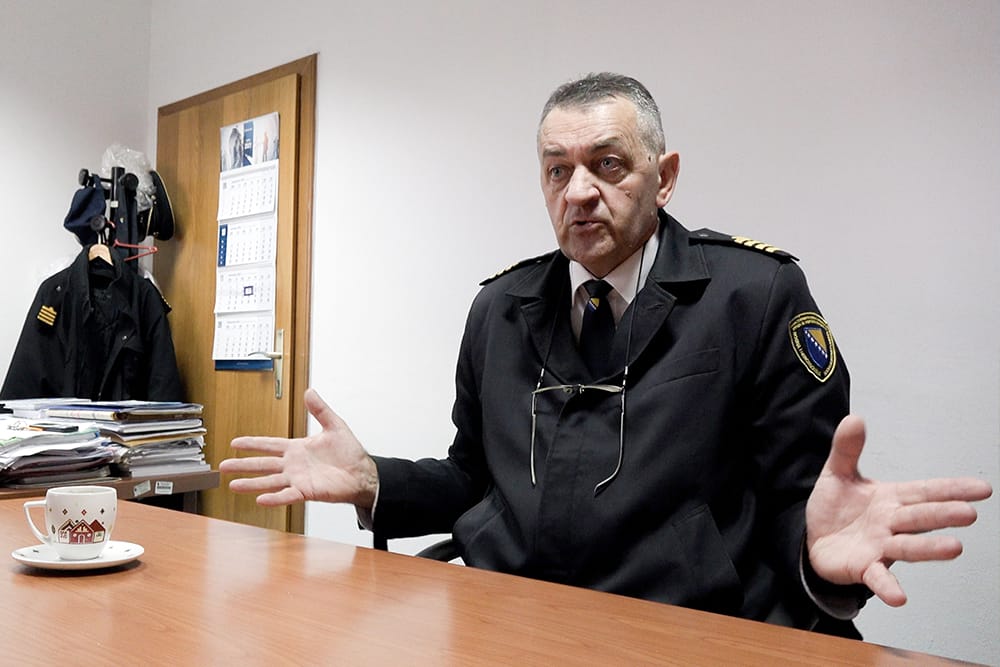
Noise in communication
Investigations by SIPA and ITABiH have shown in a dozen cases that cash transactions, tax evasion, money laundering, and illegal cash transfers are common occurrences in the import and sale of textiles.
“If based on the risk analysis carried out by customs officers there is a suspicion of any kind, such persons will be examined in detail,” said ITABiH spokesman Ratko Kovačević.
Muharem Pavitinović, who was remanded in custody in 2017 on the charges of money laundering and illegal import of textiles, never seemed fishy to customs officers. CIN journalists revealed that upon his release from custody, he crossed the Rača border crossing almost every Sunday, carrying an average of 75,000 euros. In half a year, he illegally took out of the country more than a million euros without being checked by customs officers once. He refused to talk to CIN.
Dragić claims the customs did not know that Pavitinović was under investigation and there was no reason to suspect him since no institution had officially informed them about him.
“We may even have examined him but have not found anything. Look, we will not speak hypothetically now. We’ve checked him and have not found the money. Have we done our job? Yes, we have.”
The director of the RS Foreign Exchange Inspectorate, Zorica Cvijanović, does not agree with him: “Had the customs and the border police done their job, he would not have been able to pull it off. This institution is responsible for seizing money and drawing up charges upon a report received from a Republika Srpska customs officer. “We have not had a single case since 2018”, she says.
If the border crossing is located in the Brčko District, the customs officers will independently carry out the entire procedure, while at the crossings in the FBiH there are different understandings of jurisdiction: ITABiH claims that all this falls within their remit, while the FBIH Financial Police holds that they should be dealing with drawing up misdemeanor charges. Chief Inspector Amel Topalović says that he will try to resolve these differences with the director of the ITABiH, Miro Džakula.
CIN journalists also tried to talk to him, but Džakula refused all calls.
In nearly three years, ITABiH customs officers detected an attempted illegal cash transfer worth about BAM 40 thousand at one border crossing only.
The ITABiH says that money can be easily concealed, which makes the search more difficult.
“A really small bag can hold a really large amount of money, and unless we are tipped off or have a successful random check, it is simply likely that a larger amount of money can be taken out of the customs territory of Bosnia and Herzegovina illegally without being discovered.” says spokesman Kovačević.
At the same time, their counterparts confiscated about BAM 1.7 million worth of cash at the entry and exit points from Montenegro, Serbia, and Croatia.
“Unfortunately, I have no comment at the moment. Compliments to customs officers of neighboring countries”, says Kovačević.
Prosecutor Simeunović says large amounts of cash most often point to crimes and that BiH must have an interest in keeping that money in the country because it should end up in the budget. Confronted with data on a large disparity in the amounts of money declared in BiH and the borders of neighboring countries, she concluded: “I would say the system doesn’t work.”
There’s money but no trace of its origin
While the European Union is perfecting the fight against money laundering by linking the intelligence departments of all member states with the customs services, the practice of BiH institutions and the success in preventing money laundering has not improved for years. They do not use information from other countries, nor do they know the exact distribution of responsibilities and competencies in their own country.
ITABiH believes that the Entity ministries of finance, when issuing approvals for cash transfers, also check the origin of the money, but this is not so. Although they did not want to speak to CIN journalists, they explained in their written response that they are checking only the reasons for cash transfers, which is the only thing they are required to do under the law.
CIN’s interlocutors are convinced that this should be the responsibility of the Ministry of Finance, although it is not explicitly stated anywhere.
“When someone wants to take money out of the country, it would be logical that the competent ministry of finance check and ask for some proof of origin, and then, in cooperation with the relevant Entity bodies, tax administrations, financial police … perhaps, the police can check where the money comes from and whether as such can be taken out [of the country], says Edin Jahić, head of the Department for the Fight against Organized Crime and Corruption in the Ministry of Security of BiH.
“The key issue here is how did someone get the money. It is ridiculous to let them take it out [of the country] if we do not know how they’ve got it”, argues the director of the RS Foreign Exchange Inspectorate, Zorica Cvijanović.
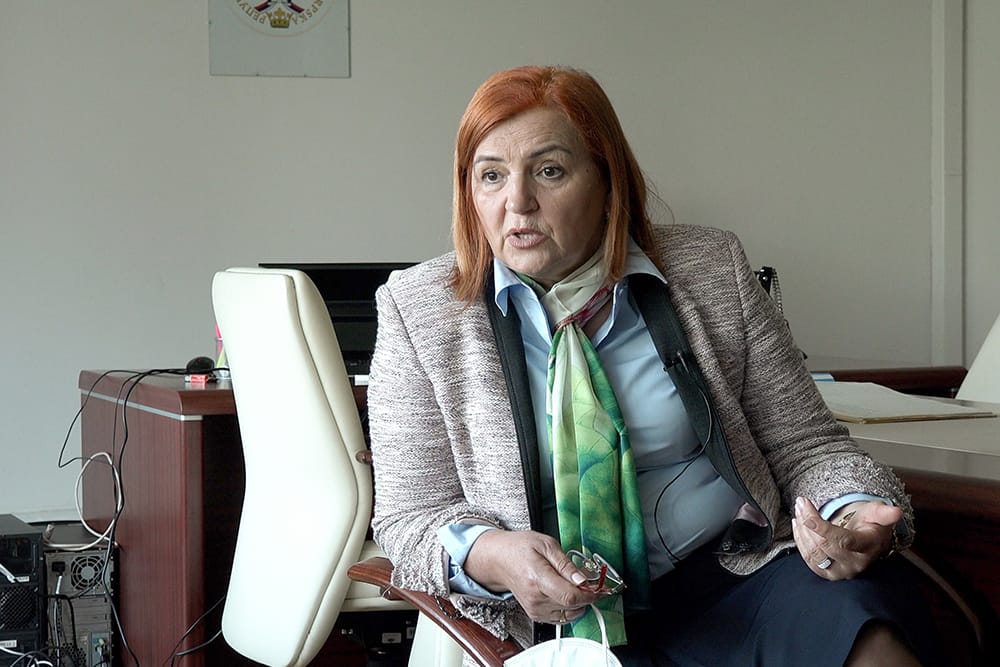
Although nearly identical regulations throughout the country set the rules for issuing approvals, the documents on the origin of cash are sought only in the Brčko District.
“When they come, they have to prove its origin, i.e., where their money came from. (…) Origin is the most important thing to know”, says Pezerović from the Finance Directorate. However, they have not received a single request for approval until early 2021.
“If the border would press the issue more strongly, they would certainly start coming here,” he said, drawing attention to the responsibility of customs officers.
Although many think that customs officers should, in addition to the cash transfer approval, ask for proof of the origin of cash taken out of the country, the head of the Rača customs office, Dragan Dragić, thinks differently: “Do you think that customs officers would, in addition to their regular duties, ask for some additional tasks?” First of all, it is human nature not to look for additional work, and the legality of that action would be questionable, if not foreseen by the law.”
Director Cvijanović concludes that the rift between the institutions benefits those who have something to hide. “If they would confiscate the money from them, perhaps they would never dare to do it that way. Why wouldn’t they do it if they see it is working?”



